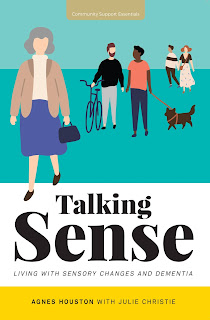Published by: Dementia Centre
Author Interview
About the authors
Agnes Houston MBE is a dementia activist who has always put
others first. She was diagnosed with younger onset Alzheimer’s disease in 2006
at the age of 57. She has campaigned for best practice and improving the lives
of people with dementia (especially those experiencing sensory issues) in
Scotland and received a lifetime achievement award from Alzheimer Scotland in
2013. Agnes is former Chair of the Scottish Dementia Working Group and
currently Vice Chair of the European Dementia Working Group and a board member
of Dementia Alliance International. In 2015 Agnes was awarded an MBE and in
2016 was awarded a Churchill Fellow.
Dr Julie Christie is Service Manager - International at the Dementia Centre, HammondCare, based in the UK. Dr. Christie is a visiting Research Fellow with the University of Edinburgh and an Adjunct Lecturer at the University of New South Wales with a focus on resilience, citizenship, and co-production. She is a reviewer for the Journal of Research in Nursing, Ageing and Society and Dementia: The International Journal of Research and Practice. Dr Christie is currently the lead for the Dementia Dog Programme evaluation and the Life Changes Trust funded Dementia Friendly Communities Programme, both in Scotland. She oversees the work of Dementia Support UK: Connect, Consult HammondCare’s UK consultancy service for care homes.









No comments :
Post a Comment
Feel free to leave a comment below - I love reading them!